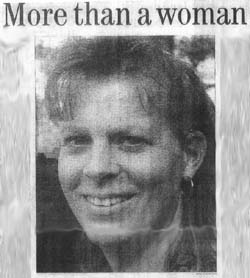In 1995, Kimberly Nixon volunteered to be a rape counsellor. Having come
out of an abusive relationship with a man, she wanted to help other women. However,
the women's centre turned Nixon away because "she" had once been "he."

Although Nixon had undergone a sex-change operation and lived 19 years
as a female, she was seen as not quite measuring up to the centre's definition
of "woman." Badly hurt by the rejection, s/he considered suicide,
but instead lodged a Human Rights complaint against the Vancouver Rape Relief
Society. For six years the case wound its way through the legal process. By
the time the hearing ended Feb. 23, the issue had boiled down to "who is
a woman?" The question is not as simple as it sounds.
Sexual identity in our culture is complex; since the first sex-change operation
in 1952, being female has ceased to be just about female characteristics and
clothing. When Michele Landsberg asked, "If a man cuts off his penis, pumps
himself full of hormones, gets silicone breasts and electrolysis, and stuffs
his feet into high heels is he/she a woman?" I cringed at the insensitive
way she said it.
However, it's not an unreasonable question. I'm not alone, I suspect, in
being puzzled by the Nixon case and wondering whether she is, as Landsberg suggests,
just "someone who wants to be a woman."
The Rape Relief Society is in a difficult position. It has taken a stand
on a topic few of us are prepared to discuss. Christine Boyle, the law professor
who represents the society, is defending it on the basis that the issue is "not
about genitals" but about politics. Since there is no legal definition
of a woman, she argues, Rape Relief is entitled to have a "political understanding"
of what it is that makes a woman. That understanding is in line with a definition
Landsberg has opted for; that being female is "a political category created
through oppression."
Rape Relief, since it was founded in 1973 as one of Canada's first women-only
centres for female victims of assault, has been a focal point of feminist political
activism, fighting for rape shield laws and federal anti-violence measures,
and trying to influence custody and access decisions. And, in all of its work
with rape victims, Rape Relief has been teaching the "political belief"
that "male violence is a symptom of a sexist society in which women are
oppressed by men. "
In its material and on its Web site, it tells women "what we know to
be the truth" -- that men enjoy positions of power and privilege; are innately
aggressive; are unworthy of trust and must be feared. The hateful propaganda
is so explicit that Lee Lakesman, a staff person at the society, is quoted as
declaring that "every man is a potential rapist."
This political stance seems to be the essence of all feminist counseling.
Laura Brown, a psychologist who is widely regarded as an expert in this area,
sees our culture to be her ultimate client and describes the therapeutic task
as "the subversion of the patriarchy in the client ... with the first responsibility
always to the project of ending oppression."
Evidently, this counseling is not so much about kindness and caring as
it is about luring injured and vulnerable women into a supposedly safe environment
where they can be indoctrinated to replace their sense of what it is to be a
woman with this new political image. From this, it follows that the selection
of counsellors, such as those who work at Rape Relief, is a matter not of gender
but of ideology. Nixon was not rejected so much because she was a transsexual
but because she did not fit the feminist image of who (or what) a woman is.
As Rape Relief staff have stated: "she did not share the same life experiences
as women who are born females and have been oppressed by men."
Obviously, I and countless other women who don't see ourselves as oppressed
victims and insist on seeing men as individuals and equals -- no better and
no worse -- wouldn't fit this image either. The issue that the tribunal must
address is whether individuals like myself and others are women, or is it that
women are those who hold in common a sense of victim mentality, an unshakable
belief in male violence and a militant dedication to a political cause?
Judy Rebick, the former president of the National Action Committee on the
Status of Women, views Rape Relief to be "a model feminist service."
Testifying at the hearing, she defended its decision by placing the issue in
the broader context of decades of political activism. Outside of the hearing
room, she commented that the question "goes to the very heart of what the
women's movement is and what feminism is."
If so, then what is at the heart of feminism is not a peaceful mission
to reach out and help other women but rather an aggressive effort to recruit
women as anti-male warriors. In seeking the answer to the difficult question
of "who is a woman," we would be well advised to ignore the feminist
mumbo jumbo about victimhood and oppression and listen to Helen Reddy's anthem:
"I am strong, I am invincible, I am woman."


